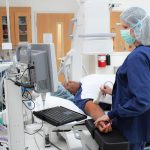PICC nurses are in high demand due to their ability to insert a peripherally inserted central catheter or PICC. A PICC is a thin and long tube that is inserted through a vein in your arm. It is passed towards the larger veins near your heart.
This type of catheterization is often used when intravenous treatment is required for an extended period of time.
As a PICC nurse, you’ll be responsible for inserting and removing PICCs, as well as providing care and education to patients and their families. You’ll need to have excellent communication and organizational skills, as well as the ability to stay calm under pressure.
What Is the Average PICC Nurse Salary?
The average salary for a PICC nurse is $94,501 yearly. However, salaries can vary depending on experience, location, and employer. New grads can expect to start at a lower salary, while those with more experience can earn a higher salary.
Salaries also tend to be higher in larger cities and at teaching hospitals. PICC nurses can also earn bonuses and profit sharing, which can increase their overall earnings. Overall, PICC nurse salaries are very good and provide an excellent opportunity to make a good income.
How Do You Become A PICC Nurse?
To become a PICC Nurse, you first need to have your Registered Nurse (RN) license. Once you have your RN license, you will then need to complete a certification program specifically for PICC Nurses. These programs can be found at many community colleges and technical schools.
Once you have completed the training program and have passed the certification exam, you will then be able to apply for jobs as a PICC Nurse. Most employers will require you to have at least 1-2 years of experience working as an RN before they will consider you for a position as a PICC Nurse.
This is because the position of PICC Nurse is a specialized one. They will want to make sure that you have the necessary skills and knowledge to be successful in the role.
What Are the Benefits of Being A PICC Nurse?
PICC nurses have a significant job, and they play a crucial role in the care of patients who require intravenous therapy. Here are 8 benefits of being a PICC Nurse:
They get to help people in need.
PICC nurses make a difference in the lives of their patients by providing them with quality care. They help to improve the quality of life for their patients and make a positive impact on their overall health.
They have a flexible job schedule.
PICC nurses can often create their own schedules, which allows them to have a good work/life balance. This flexibility is excellent for those who want to spend more time with their families or pursue other interests outside of work.
They get to work with a variety of people.
PICC nurses have the opportunity to meet and work with a wide range of people from different backgrounds and cultures. This can make the job interesting and rewarding.
They get to learn new skills.
PICC nurses are constantly learning new skills and knowledge to keep up with the latest advances in their field. This helps them to provide the best possible care for their patients.
They get to work in a variety of settings.
PICC nurses can work in a variety of settings, from hospitals to clinics to home care. This allows them to find the setting that best suits their skills and interests.
They get to make a competitive salary.
PICC nurses are well-paid for their skills and knowledge. This allows them to live a comfortable lifestyle and provide for their families.
They get to have a rewarding career.
PICC nurses have a challenging and rewarding career. They make a difference in the lives of their patients and help to improve the quality of life for those who need their expertise.
What Are the Challenges of Being A PICC Nurse?
Being a PICC nurse can be extremely rewarding, but it also comes with its own set of unique challenges. Here are eight of the most common challenges faced by PICC nurses on a daily basis:
Venous Access
One of the most important aspects of a PICC nurse’s job is to ensure that patients have proper venous access. This can be a challenge, as some patients may be resistant to the idea of having a catheter inserted.
Educating Patients
It is crucial that PICC nurses take the time to educate their patients about the proper care and maintenance of their catheters. This includes teaching them how to properly clean and dress the site, as well as how to avoid infection.
Preventing Complications
One of the most common complications associated with PICC lines is thrombosis (blood clots). PICC nurses must be vigilant in assessing for this complication and taking steps to prevent it.
Managing Infections
Although all health care workers are at risk for contracting infections, PICC nurses are especially at risk due to the nature of their work. It is important that PICC nurses take steps to avoid infection themselves, as well as manage any infections that may occur in their patients.
Dealing With Difficult Patients
Some patients can be challenging to deal with, particularly those who are in pain or experiencing other complications. PICC nurses must be patient and compassionate when dealing with these patients.
Documentation
PICC nurses are responsible for documenting all aspects of their patients’ care. This can be a challenge, as it is important to be thorough and accurate in all documentation.
Time Management
PICC nurses must be able to effectively manage their time, as they often have a lot of patients to see in a day. This can be challenging, as some patients may require more time than others.
Emotional Stress
Caring for sick or injured patients can be emotionally challenging. PICC nurses must take care of themselves both mentally and physically in order to avoid burnout.
There you have it — eight of the most common challenges faced by PICC nurses on a daily basis. While this list is not exhaustive, it does provide a good overview of the challenges that these nurses face.
With proper training and support, PICC nurses can overcome these challenges and provide high-quality care to their patients.
 Nursing Trends
Nursing Trends






